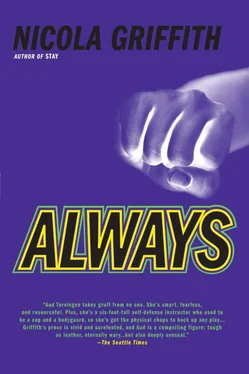I took off my clothes and folded them. I taped my left knee. I pulled on the gi, then the hakama, pulling ties tight, twisting this way then that, loosening, retying. They were stiff and harsh with newness, but despite this, and despite the fact that it had been a long time since I’d experienced the odd combination of tight belt, loose arms, and the swing of cloth around my calves, it felt deeply familiar.
When I went out onto the small mat in my hakama to warm up, Mike smiled, but nobody seemed surprised, and this time, when the bell rang, and we assumed seiza along the edge of the mat, I took the far left position, and after we bowed and sensei stood, it was me he gestured into the center to be uke.
“Kokyu-dosa.”
I stood opposite him, and took his left wrist in my right. It was a big wrist, flat and hard on top and bottom, with tiny dark brown hairs like wire sickles springing from around the wrist bone. As I gripped, he opened his fingers and I felt the massive tendons on each side expand and stretch my own fingers, opening them.
Kokyu-dosa, the blending exercise, is the most basic building block of aikido. It is gentle and fluid, and the nage does not have to worry about making sure that the uke falls well or protects his or her shoulder or wrist or elbow or hip; the uke doesn’t fall at all. The best practitioners simply breathe, and step and turn and lift both hands before them as though carrying a lightly balanced tray of tea, and the uke, if she keeps hold of the nage ’s wrist, is twisted to one side and bent forward from the waist, forehead almost to the ground.
But there is beauty in even the simplest movements.
Sensei, Petra had told me, had been practicing aikido for twenty-five years, many hours a day. He was very, very good, but as I matched myself exactly to his strength and force, skin to skin, fascia to fascia, vein on vein, as I felt his wrist joint turn smoothly and his muscles relaxed and open, I understood that he was not great. He had never been hurt, never had his confidence taken away and had to refind it, never, since young adulthood, met anyone bigger, stronger, faster or better trained.
He couldn’t teach me how to be the Aud who had never been drugged, who still had her sense of taste, who had never thought of letting someone else do the protecting: but, just as my mother was a woman who had lived twenty-five years longer than I, just as Dornan was a man with blue eyes who understood what friendship meant, he knew more aikido than I did; and I could learn.
It seemed to last for hours, but at some point it must have changed, because now he was the one wrapping his massive fingers around my wrist, heavy as a manacle, and I was the one imagining a pinpoint between my radius and ulna, leaving that point in exactly the same locus of three-dimensional space and pivoting everything else around it: keeping the same distance between that point and my center of gravity, two finger-widths beneath my navel, yet stepping forward, and turning and breathing out, and extending the imaginary tea tray. He was the one who bent down and to the side like a tin soldier slumping under a blowtorch. We changed hands, changed roles again, uke to nage, nage to uke , and soon my joints moved like frictionless electromagnetic bearings and my autonomic nervous system hummed like a transformer reaching capacity.
NINE O’CLOCK.The night was clear and I drove down the viaduct with the windows down, cool air sliding over my arms, tires hissing and splashing through standing puddles. In Atlanta the temperature would be about seventy-five degrees, and the air scented with jasmine and honeysuckle and laced with the creak and chir of crickets and tree frogs. There would be less atmospheric pollution, and the stars would be brighter and sharper. There would be less traffic.
Half the parking lot’s sodium lamps were dead, and what remained painted the dark with brass. The right-hand side of the lot was crowded. The two Hippoworks trailers were lined up neatly, side by side, Kick’s van next to them. The left-hand side of the lot was cordoned off and Janski stood in front of the cones, hyperalert, head swiveling this way and that, weight forward on his toes. I got out of the car. I could smell the metallic tang of adrenaline and testosterone.
“What happened?”
“Probably nothing, ma’am.” He scanned the shadows.
“When?”
“An hour ago. I thought I saw someone approaching one of these gas lines.”
“Gas.”
“Propane, ma’am. For the stunt tomorrow.”
My heart began to pump smoothly, powerfully.
“Just one person?”
“Hard to tell. They ran off when I challenged them.”
“And you’ve searched the area?”
“Ma’am, Mr. Turtledove’s inside, perhaps you’d like to speak to him about it.”
I listened, sniffed. Nothing. I nodded to Janski and went in through the side door. Everything seemed to glow, as though specially lit. The lock looked different: newer, bigger.
Rusen, Finkel, Deverell, and Philippa were huddled in a knot about ten feet to the left of the door. They straightened when they saw me. “You’ve heard about our intruder,” Finkel said.
I looked at Deverell. “Prowler,” he said. “I tried to call. Janski thought he saw someone near the pipeline in the lot. He gave chase. He called me. He and I searched the immediate vicinity while Philippa and the stunt coordinator, Kuiper, checked the lines. Nothing damaged. No sign of the prowler.”
“We used one of the production’s portable arc lights to check the lines,” Philippa said. “As far as is humanly possible, I can guarantee they haven’t been disturbed.”
There were no guarantees. Beware, my body said, but there was nothing.
“And the search?”
“Very close on the property itself,” Deverell said. “Foot canvassing on a slightly wider perimeter, visual and audio beyond that.”
Translation, they’d checked every window and door, turned over every garbage can and grate on my property, walked up and down the closer streets, and looked and listened. But ware! my back brain was shouting. Ware!
“I told them we should leave that light out there,” Finkel said. “As a deterrent. ”
“No, sir,” Philippa said. “Not unless you’ll authorize more personnel. Remaining near the light renders night vision useless. We’d need more people to cover the perimeter.”
“There’s no budget for that.”
I looked from Finkel to Rusen. “I was here yesterday. The place was deserted. ”
The conflicting messages—everything is safe, and beware—were making me jumpy.
“That’s my fault,” Rusen said, embarrassed. “I’d given everyone else the weekend off and it seemed wrong to make Jan stay. I told him to go home.”
“Mr. Rusen suggested to Janski that he leave, so he did but, sensibly, he called me. I got here as soon as I could.”
“How long?”
“No coverage for four hours. No signs of attempted ingress.”
“The locks?”
He shook his head. “Not changed until this morning.”
Four hours. Turtledove seemed about to say more, but I shook my head slightly, trying to think. “Stan, Anton, we’ll need to talk later. The trailer? Thank you. Deverell, Philippa, walk with me.”
When Finkel and Rusen were out of earshot, I said, “Where is Mackie— Eddard?”
“I don’t know,” Deverell said. “Nor do the police. The younger one, though, Finkel’s son, has been back in New Jersey for two days.”
“Find Mackie. Hire whoever you have to. Start now.” Was that it? Something else? “I’m going to check with Kick about that gas line.”
Читать дальше












